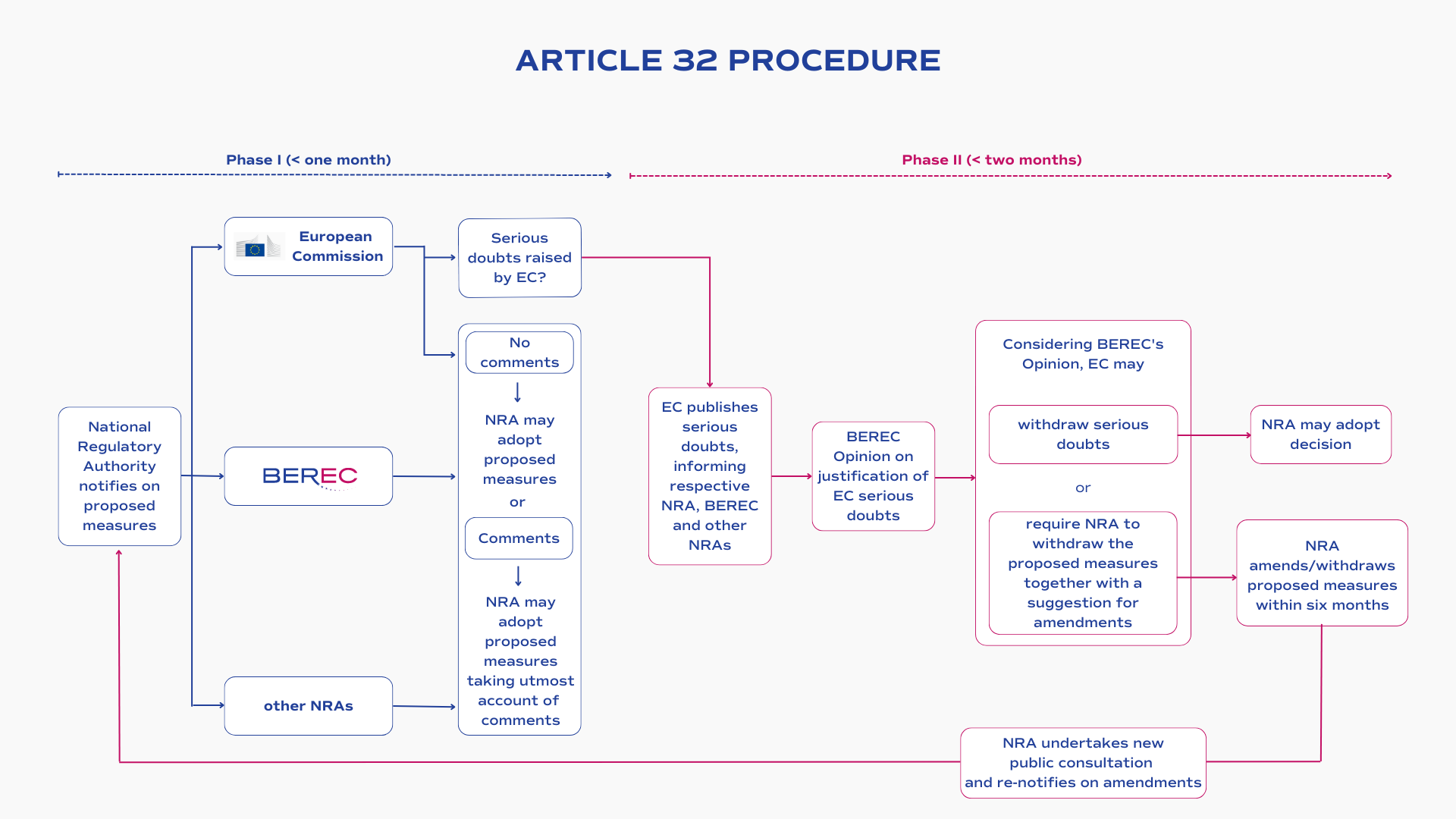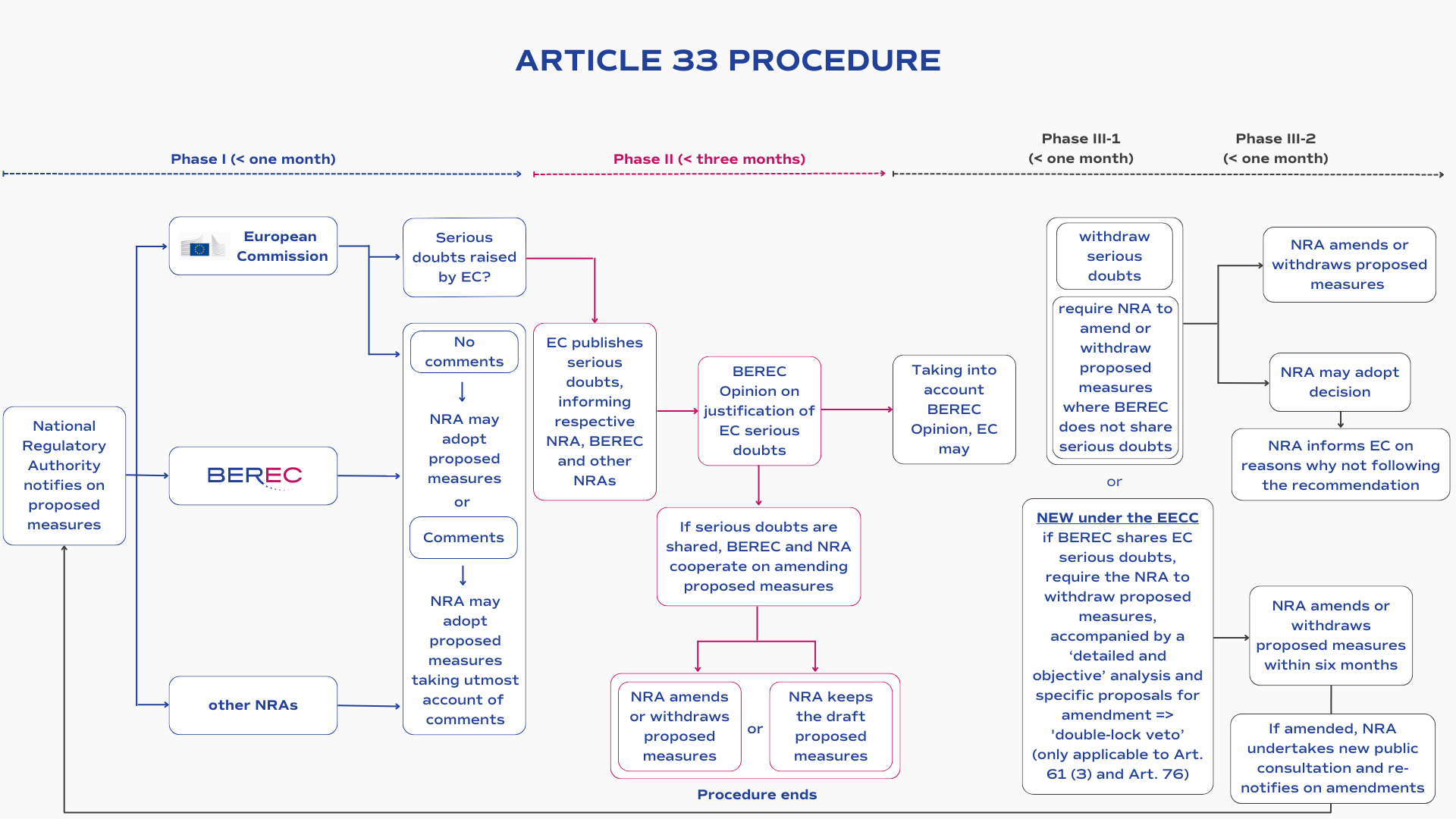Article 32/33 (Former Article 7/7a)
Role and procedures of BEREC
Under Directive (EU) 2018/1972 of the European Parliament and of the Council of 11 December 2018 establishing the European Electronic Communications Code – the 'EECC', National Regulatory Authorities (NRAs) are required to analyse a set of markets for electronic communications that may need ex ante regulation.
This analysis contains three different elements:
- market definition – first the NRA must define the relevant geographic and product market;
- Significant Market Power (SMP) assessment – in a second step, the NRA must analyse whether one or more undertaking active in that market possesses SMP, either individually or jointly with others;
- decision on remedies – if the NRA identifies a market with a lack of effective competition, it is required to impose certain regulatory obligations or ‘remedies’.
The basis for this kind of measure is the European Commission’s (ECs) Recommendation on relevant product and service markets within the electronic communications sector susceptible to ex ante regulation, which contains a list of markets that should be subject to ex ante regulation. Whenever an NRA concludes that a given market shows failures that hamper competition, it must impose appropriate remedies on undertakings with SMP in accordance with the universal service and market access aspects of the EECC.
Analysis
In accordance with Articles 32 and 33 of the EECC, the findings of market definition, SMP assessment and – if applicable – the proposed remedies, must be notified to the EC and other NRAs. The aim of this European Union (EU) notification is to contribute to the development of a single market in electronic communications by ensuring co-operation among NRAs, and between NRAs and the EC.
Once an NRA notifies the EC of its proposed measure, the case is assessed by the EC within one month. At the end of this period and provided that the notified measure does not raise ‘serious doubts’ as to its compatibility with EU law, the EC may decide to comment. Regulators should take these comments into account before adopting the draft measure in question.

Opinion on serious doubts
When the EC expresses serious doubts and opens a ‘Phase II’, its investigation period is extended by two months in the Article 32 cases, or by three months in the Article 33 investigations. If this situation occurs, BEREC must issue an opinion on whether these serious doubts are justified. In the case of Article 33, BEREC gives its opinion within six weeks from the beginning of the three-month period. For this purpose, BEREC has set up a procedure under the Board of Regulators Rules of Procedure to establish a Working Group (WG) for drafting an opinion.
The Board of Regulators must adopt the final BEREC Opinion with a two-thirds majority. The BEREC Opinion must be sent to the EC on the same day of adoption and must be published in full within three working days from being delivered to the EC.

Responses to serious doubts
In the event that BEREC – in its Opinion issued under Article 33 – shares the ECs serious doubts concerning the draft regulatory obligations notified by the NRA, the relevant WG must cooperate closely with the NRA concerned in order to identify the most suitable and effective remedies. Before the end of three months, the NRA may either:
- amend or withdraw its draft measure, taking utmost account of the EC’s notification and BEREC’s opinion; or
- maintain its draft measure.
The EC may, within one month following the end of the three-month period, and taking utmost account of BEREC’s opinion, if any:
- issue a recommendation requiring amendment or withdrawal of the draft decision, in particular where BEREC does not share the EC’s serious doubts;
- withdraw the serious doubts; OR
- require the NRA to withdraw the draft decision, accompanied by a ‘detailed and objective’ analysis and specific proposals for amending the draft decision, if BEREC shares the EC’s serious doubts (‘double-lock veto’). New procedure under the EECC.
This only applies to symmetric access beyond the first distribution point (Article 61(3)) and co investment offers in Very High Capacity Networks (Article 76).
Then, the NRA amends or withdraws its draft decision within six months.
If amended, the NRA undertakes a new public consultation (Article 23) and sends a renotification of the amended draft decision.
For more details, see the Board of Regulators Rules of Procedure.